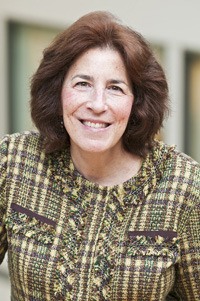Islander and epidemiologist, Dr. Andrea LaCroix is again at the center of the decades-long discussion about the efficacy and risks of hormone replacement therapy for menopausal women. The results of the recent phase of the studies she has lead indicates some significant benefits for women who took estrogen alone beginning in their 50s after hysterectomies.
From the paper in the Journal of the American Medical Association to lengthy stories in the New York Times and the McNeil Leher Report, LaCroix has been questioned and quoted about what these new results mean. The findings will most certainly add to discussions between women and their doctors about other risks of medication to ease the symptoms that can occur with menopause.
LaCroix is a professor of epidemiology at the University of Washington, where she works at Fred Hutchinson Cancer Research Center. She is the lead investigator tracking the health of thousands of women who were participants in an unprecedented study of hormone use begun in 1991. The studies, which looked at the effects and risk of hormone medication on menopausal women, were conducted through the Women’s Heath Initiative (WHI) study funded by the National Institutes of Health (NIH). Millions of women contemplate taking hormones each year.
Data from the U.S. Census suggests that women between the ages of 45 and 55, represent the single largest segment of the U.S. population.
The Reporter first wrote about LaCroix and her work on the WHI studies in 2002.
LaCroix is the lead author of the findings published in the April 6, 2011, issue of the Journal of the American Medical Association. The news headlined national media outlets and was reported and parsed by journalists, readers and doctors everywhere.
The findings of the study represent a reversal of sorts from the news of 2002 and 2004, when the NIH sounded a cautionary alarm about what they perceived was an unacceptable risk to participants of hormone replacement therapy. NIH stopped the study on the combination of hormones in 2002, and the estrogen-alone study in 2004.
But researchers continued to follow the women to find out what effect the hormone use — taken even for just a short period of time — might have on the health of the participants in the long term. Their health was followed and compared to those who did not take the drug.
The study yielded a surprising result. The hormone-taking women who had hysterectomies, who used estrogen alone, showed a 23 percent lower risk of invasive breast cancer than their counterparts who were taking no hormones at all.
“The data seemed to ‘speak clearly,’” LaCroix said for benefits lasting well after the drug had been stopped.
“In their 50s, women can be very reassured that, if they decide to take hormone therapy for relief of menopause symptoms or for other reasons, that they’re not going to have an increased risk of breast cancer; they’re not going to have more heart attacks. In fact, their risks of those outcomes might be lower.”
LaCroix said there are other important findings.
Risks and benefits of hormone therapy differ importantly by age for several types of chronic disease: heart attacks, colorectal cancer, death. Overall, chronic diseases are lower among women taking the single hormone therapy in their 50s compared to placebo, but among women in their 70s, they actually had higher rates of all these conditions if they were taking estrogen alone vs. placebo.
There are some caveats, to be sure. Every patient is different. The study was not designed to measure the effect of when or how long to take the drug.
Despite these encouraging results for this particular set of women, LaCroix emphasizes that the results — both positive and negative — are useful for all.
These studies are about health and about informing women, she said. “It is not clear what each individual should do,” she said.
LaCroix holds a master of science in public health nursing and a Ph.D. in epidemiology, the study of the causes of disease, from the University of North Carolina in Chapel Hill, N.C., in 1984. She spent many years in Washington, D.C., where she earned her first nursing degree at Georgetown University. She later returned there to post doctoral studies at Johns Hopkins University and the National Institutes of Health.
Islanders since 1989, LaCroix and her husband, Fred LaCroix, have two seniors at Mercer Island High School. The twins are in the high school marching band that performed in the New Year’s Day parade in London in January.
“Each arrived in the city via different flights,” their mother said, noting that she and her husband got up in the middle of the night to watch them march on television. They are heading off to college next fall. She said it is going to be very different with both gone at the same time.
Of the media attention, LaCroix said that it has been “a privilege to interact with the media,” noting “they are bright and informed.”
“I am here to help people to understand what all of this means,” she explained. “I have had all sorts of good conversations. Hopefully, it will help encourage more introspection about how we view these types of therapies.”
Learn more
For more information on the results of this and other WHI studies and resources, go to www.whi.org.
LaCroix is also part of a study called ‘MsFlash’ sponsored by Group Health Research Institute. Seattle is one of five locations in the United States conducting the study. Islanders received a flyer about the study in the mail earlier this month.
The study needs participants, ages 40 to 62, to study how yoga, exercise or taking Omega-3 fatty acids might ease hot flashes. The 16-week study will involve either yoga classes or exercise, the supplement or placebo.
Participants may receive up to $150 for completing the activities. Call 1-877-828-4508 or e-mail join.msflash.org.



